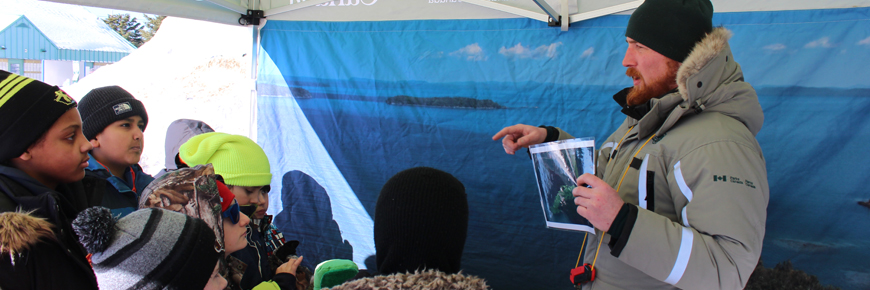
Turning visitors into citizen scientists
Pukaskwa National Park
by Chris Robinson and Sarah Shruiff
By working with others, Parks Canada team members are providing year-round opportunities for people to learn about the abundance of local species that call our sites home.
Parks Canada sites in Northern Ontario were busy this past year using the help and enthusiasm of visitors and volunteers (a.k.a. citizen scientists) to “blitz” our protected areas and monitor biodiversity. A BioBlitz is an event organized to highlight the variety of local species and share the excitement of scientific research. Parks Canada staff from the Sault Ste. Marie Canal National Historic Site, Fort St. Joseph National Historic Site and Pukaskwa National Park, in collaboration with many external partners, held a BioBlitz at Fort St. Joseph in June 2017. This past February, Lake Superior National Marine Conservation Area (NMCA) with the support of Ontario Ministry of Natural Resources and Forestry and other volunteers held a winter BioBlitz in Terrace Bay for students in Grades 3 to 6. The differences between these two BioBlitz events showcase how this activity can offer unique visitor experiences, while also obtaining new biological information to aid in future park management.
The Fort St. Joseph BioBlitz was a classic 24-hour event beginning at noon on June 24 and running until noon on June 25. Over the two days, 135 visitors joined short walks to find and identify local plants, butterflies, dragonflies, aquatic invertebrates, birds and whatever else happened to be around! Fort St. Joseph isn’t just the site of an historic British military outpost; at almost 4 km2, it offers a number of nature trails around the surrounding forest and extensive shoreline, including great views of Lake Huron. Local experts in field biology explored these trails and provided visitors with opportunities to find salamanders hiding under boards, catch and release butterflies and dragonflies, catch and release small mammals such as mice and voles, and even hear owls calling in the night. In total, 405 species were identified, with 227 of them being officially recorded at the site for the first time. This event also confirmed the presence of three federally-listed Species at Risk: monarch butterfly, wood thrush, and eastern wood-pewee.
On February 22, Lake Superior NMCA hosted more than 100 elementary school students in Terrace Bay for a fun, educational outdoor experience. Students at the BioBlitz took part in a variety of stations such as tree identification, trapper education, bannock making, winter survival, an ice fishing activity, and a field inventory station. Students strapped on snowshoes and learned how to identify trees and plants in winter, as well as, assess the growth and health of trees. During the day, the students made 37 biological observations, and identified 21 different species. This annual event encourages local youngsters to learn about the north shore region and its fascinating natural heritage.
Want to get involved in an upcoming BioBlitz? Pukaskwa National Park is hosting a 24-hour BioBlitz August 10 and 11, from noon to noon, this summer. Visitors will have the opportunity to discover the nature lurking in this rugged and vast park.
- Date modified :